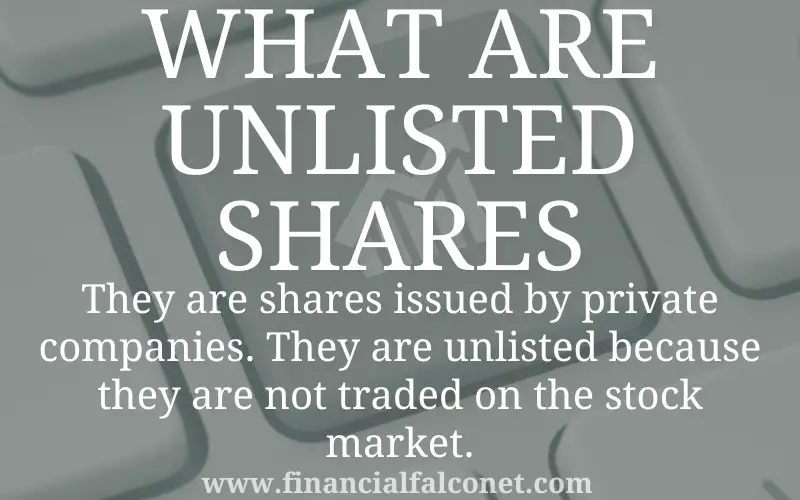What are unlisted shares?
Unlisted shares are shares of private companies that have not yet offered their shares for sale in an initial public offering (IPO). In other words, the companies have not gone public. Like all other kinds of shares, they are also considered financial instruments.
There are different classes of shares, they include small-cap, blue chip, cyclical, growth, large-cap, value, tech, mid-cap, preferred, equity, income, etc. All these aforementioned shares are generally called listed shares because they trade on major exchanges such as the New York Stock Exchange (NYSE) and the National Association of Securities Dealers Automated Quotations (NASDAQ).
Shares that cannot be bought or sold on major exchanges are classified as unlisted shares. Usually, these shares are traded over the counter (OTC) and are therefore known as OTC shares. The price quotes for unlisted shares are gotten through the OTC Link LCC (formerly known as pink sheets) or the OTC bulletin board (OTCBB) which are facilities of OTC Markets Group Inc and the Financial Industry Regulatory Authority (FINRA) respectively.
Unlisted shares are mostly traded from broker to broker but some are traded on the gray market via gray sheets. Gray markets are platforms that trade unlisted shares which have failed to meet the requirements needed for them to be listed on either OTC Link LCC or OTCBB. They also trade unlisted shares of companies whose products might be considered illegal in the United States.
Although unlisted shares are mostly offered by startup companies who are too young to meet the requirements needed in order to be listed on any of the major exchanges, some well-established companies that are privately owned and do not wish to go public also offer unlisted shares.

Where to buy unlisted shares
- Companies
- Share promoters
- Brokerages
- Employees
Investors seeking to purchase unlisted shares can do so through any of the above-listed means which we shall briefly discuss below.
Buying from companies
Some companies seeking investors could offer the investors unlisted shares in exchange for the capital they will invest into their business. Alternatively, investors could approach companies they wish to invest in and offer them funds in exchange for shares in the company.
Buying from share promoters
Share promoters are individuals who help companies to get investors who are willing to invest in their business by buying their shares. Unlisted shares can be easily purchased from these promoters as far as the investors have the required funds to make the purchase.
Buying from brokerages
There are brokerages that are known to offer unlisted shares as part of the investment options they offer to investors. This is another means of obtaining unlisted shares.
Buying from employees
Companies both established and startups are known to compensate their employees by issuing restricted shares or employee stock options to them. If these companies are private companies, investors could purchase these shares from the company’s employees at preset prices.
See also: Restricted shares and Stock options
Features of unlisted shares
- Not listed on major exchanges
- Low liquidity
- Low volatility
- High risk
- Close market investment
Not listed on major exchanges
The main feature of these shares and how they derive their name stems from the fact that they are not listed on the U.S stock exchange. Instead, they are bought over the counter through brokers who sell them or directly from the company or its employees.
Low liquidity
Considering that most companies that issue these types of shares are either startups or private companies, they may not have ready buyers. This means that it will take some time for investors who own these shares to readily sell them off when they want.
Low volatility
Unlike listed shares whose prices can be easily affected by market forces of demand and supply or other company-related issues; unlisted shares are less likely to experience these changes in share price as both demand and supply are largely stable for them.
High risk
Due to the fact that these stocks rarely have minimum requirements for sale and are generally not regulated, investing in them presents a higher risk to the investors. The illiquid nature of these shares combined with the low information on their issuing companies also adds to their being a high-risk investment.
Close market investment
Unlisted shares are usually traded over the counter, this means there is closer contact between the buyers and sellers of these shares which is not the case with listed shares such as dividend stocks. This helps investors have a better understanding of the companies whose shares they are purchasing.
See also: Features of common shares
Pros and cons of unlisted shares
The pros and cons of unlisted shares are those characteristics that are either a benefit or drawback for investors who own or seek to purchase these shares. We shall discuss these pros and cons below.
Pros
- Massive profits
- Risk diversification
- Negotiable share prices
- High growth
- Probable undervaluation of shares
Massive profits
One of the main reasons for investing is to get a good return on investment (ROI). With unlisted shares, there is a possibility of getting massive profits from your investment, especially if the company whose unlisted shares you purchase becomes listed and experiences an increase in their share prices compared to when you purchased them.
Risk diversification
These shares present an alternative for investors who want to diversify the risks associated with their investments. If for example, an investor owns bonds, stocks, or other forms of investment, they can choose to diversify their portfolio by purchasing some unlisted shares too. This way, you have mitigated the risk arising from having only one type of investment.
Negotiable share prices
Unlisted shares rarely have fixed prices; this is largely due to the limited number of buyers and sellers as well as the limited number of companies that offer these types of shares. The prices of these shares are therefore negotiable and investors could purchase them at relatively low amounts.
High growth
Unlisted shares are mostly issued by startups, if these startups have a sustainable business model, they could experience exponential growth within a short period of time. The high growth rate will in turn affect the share price positively and even dividend payments for companies who declare dividends. This is because they are most likely to have a limited number of shareholders.
Probable undervaluation of shares
Since these shares have low liquidity, it means fewer investors are willing to invest in them; this in turn means that there is a high chance that they are undervalued. If they are, it presents a huge opportunity for investors who purchase them at the early stages before they get a proper valuation and become more expensive.
See also: Business valuation methods
Cons
- Inadequate information
- Loss of invested capital
- Little or no dividends
- Share dilution
- Low liquidity
Inadequate information
Since unlisted shares do not trade on major exchanges and are mostly issued by startup companies, information on the issuing companies such as their financial standing, business model, assets, liabilities, revenue, etc. is generally inadequate or nonexistent in some cases. This is because most of these companies need not meet any minimum requirements required for listing on major exchanges. Additionally, startups that have been operating for only a few years might not have any substantial information available to the public.
Loss of invested capital
The fact that not much information is available for unlisted shares makes it liable for use by fraudsters to defraud investors of their money. Additionally, if you invest in companies that are unable to stay in business through having a sustainable business plan as well as efficient use of funds for business growth; you stand the risk of losing all your invested capital if the company liquidates.
Little or no dividends
Considering that the companies that issue these shares are mostly private companies, most of them are more concerned about reinvesting profits into the business to grow it and not declaring dividends. Therefore, investors are likely to get paid very little dividends and inconsistently too. Some companies might not even declare dividends, which means investors do not get paid dividends.
Share dilution
If the companies that have issued unlisted shares decide to go public, they will have to offer new shares to investors in an initial public offering (IPO); this will inadvertently lead to the dilution of the company’s previously unlisted shares.
Low liquidity
Since unlisted shares do not trade on major exchanges, they are generally harder to buy or sell when compared to other shares which can be easily bought and sold because they are traded on the stock market.
Related: What are Diluted shares?
Unlisted shares vs listed shares
So far, we have discussed various aspects of unlisted shares. Here, we shall compare them with listed shares to see the similarities they share and what differentiates them. Before then, let us understand what listed shares are.
What are listed shares?
Listed shares are those shares that are traded on the U.S stock exchanges. They include voting shares, cumulative preferred shares, etc.
Similarities between unlisted and listed shares
- Unlisted and listed shares are both types of authorized shares.
- Both have some level of risk
- They are both volatile but their volatility vary
Unlisted shares vs listed shares differences
| Unlisted shares | Listed shares |
| They are not traded on the stock market | They are traded on the stock market |
| These shares are issued by startups or established private companies | Listed shares are issued by publicly traded companies |
| Unlisted shares have a low liquidity | These shares are highly liquid |
| There is close contact between buyers and sellers of unlisted shares | There is little or no contact between the buyers and sellers of listed shares since they mostly purchase them directly from the stock market |
| They are a high-risk investment | They are a low-risk investment |
| Information about companies that issue unlisted shares is not as easily and readily available | Information about companies that issue listed shares is more easily and readily available |
| Unlisted shares have a low volatility | Listed shares have a higher volatility |
| Investors stand the risk of losing all their investment | Investors will rarely lose all their investment |
| Rarely pay dividends | Mostly pay dividends |
| Companies that issue these shares have a high growth potential | Companies that issue these shares are mostly matured companies hence they have a low growth potential |
Conclusion
Although every type of investment has its associated benefits and risks, the risks associated with unlisted shares are slightly on the high side. This is so because most of the requirements needed for listing on major exchanges are eliminated with these shares. Therefore, it is harder to pinpoint companies that do not have a good business model or have an extremely risky business plan. It is therefore pertinent to carry out considerable research on any company that offers unlisted shares in order to be sure if they are worth investing in or not.
Last Updated on November 8, 2023 by Nansel Nanzip BongdapBlessing's experience lies in business, finance, literature, and marketing. She enjoys writing or editing in these fields, reflecting her experiences and expertise in all the content that she writes.

